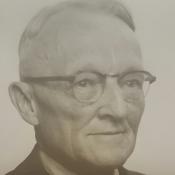Roy Bernard Kester
 The son of Julius B. and Jessie M. Corn Kester was born on September 11, 1882, in Cameron, Missouri. He graduated at 16 in 1898 from Cameron High School. He received a bachelor's degree from both Missouri Wesleyan College (1902) and University of Denver (1911), from which he was also awarded a master's degree in 1912. He received a doctor's degree from Columbia University in 1919. In 1941, an honorary Doctor of Laws degree was bestowed upon him by Baker University. He was certified as a CPA in 1914 (Colorado).
The son of Julius B. and Jessie M. Corn Kester was born on September 11, 1882, in Cameron, Missouri. He graduated at 16 in 1898 from Cameron High School. He received a bachelor's degree from both Missouri Wesleyan College (1902) and University of Denver (1911), from which he was also awarded a master's degree in 1912. He received a doctor's degree from Columbia University in 1919. In 1941, an honorary Doctor of Laws degree was bestowed upon him by Baker University. He was certified as a CPA in 1914 (Colorado).
During the period 1902-05 he was on the faculty at Missouri Wesleyan College and from 1907 to 1915 he held two more teaching positions, first at East Denver High School and then at the University of Denver. In 1915, he joined Columbia University, becoming an assistant professor in 1919, an associate professor in 1920 and a professor in 1922, the position he held at retirement in 1948. He was a member of the Administrative Board of the School of Business from 1922 to 1931, when the Board was abolished. His practical accounting experience included several years (1911-15) of part-time public accounting in Denver, Colorado, and after 1917 he was associated with Boyce, Hughes and Farrell in New York and he continually served as a consultant, including important assignments with the federal government.
He was active in professional organizations, serving as president (1925) and vice president for three years (1922-24) of the AAA. He served the NAA as director of research and publications (1925-28) and chairman of its special committee investigating the topic of interest cost (1920). He was president (1915) and a member (1914-15) of the Colorado State Board of CPAs, and a member of the board of directors of the New York State Society of CPAs (1944-47). He served on the AICPA's Committee on Accounting Procedure. He also held membership in the FEI and the Colorado Society of CPAs (honorary life). He was one of a three-member committee to redraft the provisions of the Revenue Act of 1938, providing for the use of the last-in, first-out method of inventory valuation for federal tax purposes. In 1964 he received the Alpha Kappa Psi Foundation Accounting Award.
He wrote articles frequently for professional journals and among his authored books are the three-volume series of Accounting Theory and Practice: Principles of Accounting, Volume 1 (1917), Advanced Accounting, Volume 11 (1918), Accounting Applications to Various Forms of Business and Industry, Volume III (1921); Problems and Practice Data for Elements of Accounting (1916); Fundamentals of Accounting Principles and Practice of Bookkeeping, two volumes, with S. Bernard Koopman (1921); Depreciation (1924); and Corporate Financial Statements - Proceedings of the Accounting Institute, with Howell A. Inghram, editors (1940). He was a co-editor of the periodical Administration. He was instrumental in organizing the college of accountancy as a unit of the school of business at Columbia University (1936). He was a member of Beta Gamma Sigma and national president of Alpha Kappa Psi.
He married Isadore S. Van Gilder in 1915; they had one child before his wife died in 1918. In 1929, he married Edith Case. During his leisure time, he enjoyed fishing, tennis, horseback riding, mountain climbing, hiking, cooking, and people. He died October 21, 1965 at the age of 83.
 The son of Julius B. and Jessie M. Corn Kester was born on September 11, 1882, in Cameron, Missouri. He graduated at 16 in 1898 from Cameron High School. He received a bachelor's degree from both Missouri Wesleyan College (1902) and University of Denver (1911), from which he was also awarded a master's degree in 1912. He received a doctor's degree from Columbia University in 1919. In 1941, an honorary Doctor of Laws degree was bestowed upon him by Baker University. He was certified as a CPA in 1914 (Colorado).
The son of Julius B. and Jessie M. Corn Kester was born on September 11, 1882, in Cameron, Missouri. He graduated at 16 in 1898 from Cameron High School. He received a bachelor's degree from both Missouri Wesleyan College (1902) and University of Denver (1911), from which he was also awarded a master's degree in 1912. He received a doctor's degree from Columbia University in 1919. In 1941, an honorary Doctor of Laws degree was bestowed upon him by Baker University. He was certified as a CPA in 1914 (Colorado).